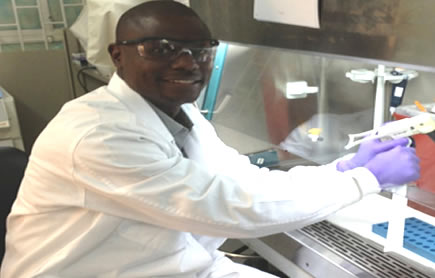 We highlight work done by Associate Professor, David Meya – THRiVE-2 Postdoctoral fellow. THRiVE’s support has been instrumental in setting the stage for building David’s professional career over the last 8 years. His research has focused on improving the grim outlook of cryptococcal disease in sub-Saharan Africa through observational, translational science, and clinical trials. His work has impacted policy and practice on treatment of cryptococcal meningitis.
We highlight work done by Associate Professor, David Meya – THRiVE-2 Postdoctoral fellow. THRiVE’s support has been instrumental in setting the stage for building David’s professional career over the last 8 years. His research has focused on improving the grim outlook of cryptococcal disease in sub-Saharan Africa through observational, translational science, and clinical trials. His work has impacted policy and practice on treatment of cryptococcal meningitis.
Over the last decade, there have been tremendous strides in improving outcomes of individuals infected with HIV, especially in terms of access to long term Antiretroviral Therapy (ART) and improved life expectancy. Although there have been rapid and significant declines in the incidence rates of opportunistic infections in the developed countries, this decline has not been as dramatic in sub-Saharan Africa.
One such infection is caused by the fungus, Cryptococcus, which has sadly not seen the expected dip in the number of cases even with the rapid roll out of ART across Africa, reaching the millions that continue to be infected with HIV.
The current global estimates of cryptococcal disease suggest a 6% prevalence of cryptococcal antigenemia among HIV-infected individuals with a CD4<100 cells/mL, translating to 278,000 patients with cryptococcal antigenemia while an estimated 223,100 incident cases of cryptococcal meningitis occur worldwide. Unfortunately, the bulk of this disease occurs in sub-Saharan Africa, which bears 73% of the disease burden with approximately 136,000 deaths annually.
The Cryptococcal Outcomes on ART (COAT) trial, for which David was the Ugandan Principal Investigator, was conducted in Kampala, Mbarara in Uganda and Capetown in South Africa. The study enrolled 177 participants with cryptococcal meningitis and demonstrated that starting ART too soon (7-11 days) after the diagnosis of cryptococcal meningitis was detrimental, This definitive trial answered the question on the optimal timing of ART after cryptococcal meningitis and led to a policy shift in WHO guidelines. Similarly, during this trial, the team demonstrated that electrolyte pre-supplementation rather than waiting to replace deficiencies in electrolytes following administration of the antifungal drug, amphotericin, for cryptococcal meningitis, prevented mortality during induction treatment of cryptococcal meningitis – this strategy was also adopted in the WHO guidelines. Implementing these two clinical strategies has possibly prevented thousands of cryptococcal-related deaths.
During his PhD training, David explored the immunopathogenesis of immune reconstitution inflammatory syndrome, a complication of starting ART in which patients previously treated successfully for an opportunistic infection seemingly worsen after they initiate ART. He demonstrated through immunology assays using cells obtained from spinal fluid and blood that during this complication, there is a specific immunological signature and type of cell that migrates into the central nervous system, making the spinal fluid more inflammatory from the migration of these innate immune cells known as monocytes.
As Principal Investigator on a randomised clinical trial in 17 clinics in Uganda that aimed to evaluate the screen and treat strategy for cryptococcal antigenemia (CrAg) in patients, David set out to determine the effectiveness of this intervention on decreasing mortality among the general population of HIV-infected patients with CD4<100 cells/mL.
This population was screened for presence of cryptococcal antigen in blood and those with a positive CrAg test would be treated with the antifungal drug, fluconazole, for 10 weeks. The team demonstrated that this strategy is much more effective as an intervention among individuals with higher burden of cryptococcal infection, where the titer of cryptococcal antigen is >1:160. This work has led to the modification of the rapid diagnostic lateral flow assay for cryptococcal antigen to incorporate the ability to provide a semiquantitative CrAg result.
THRiVE is a programme of the Developing Excellence in Leadership, Training and Science (DELTAS) Africa, a scheme of The African Academy of Sciences being implemented with the support of Wellcome and UK’s Department for International Development (DFID) to train and develop world class researchers and research leaders in Africa.
